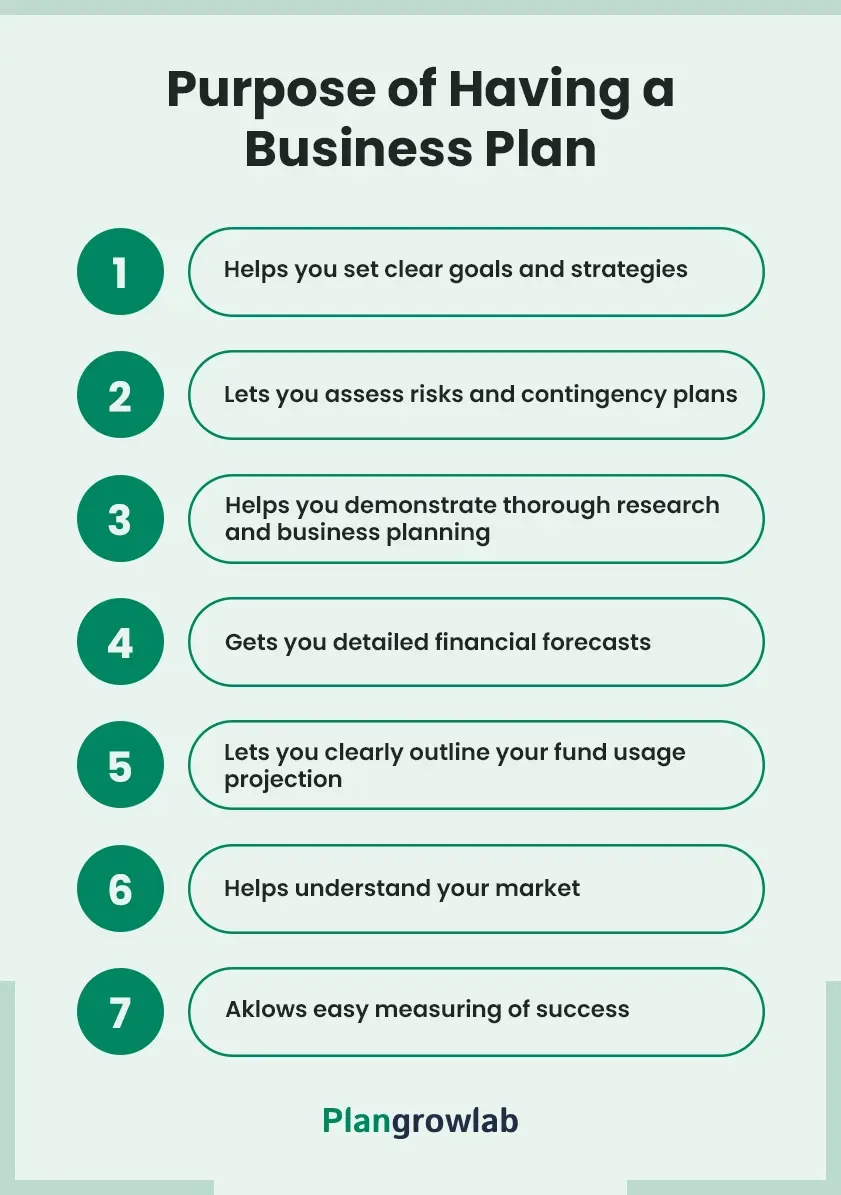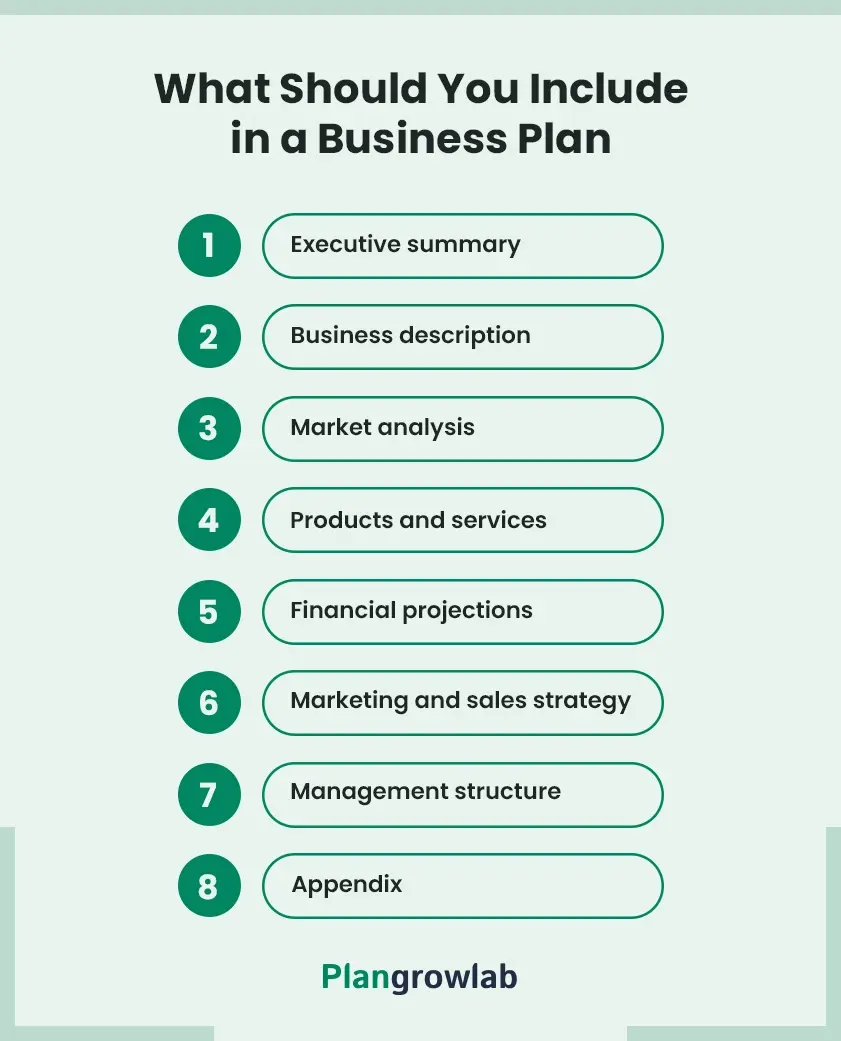How do you define a business plan and why should you care? Well, imagine this. You’ve got an incredible business idea. You’re excited, and you know it’ll work, but when you start pitching to investors or even just mapping out your next steps, things feel scattered. (Gulp!)
Don’t stress, that’s where business plans come in. They’re like your roadmap, guiding every decision and keeping you focused on your goals. Whether you’re looking for funding or just trying to clarify your vision, a solid plan is invaluable.
So let’s dive into what makes business plans so important and why you need one too.
What is a business plan?
Business plans are detailed guides that lay out what your business is, where you want it to go, and how you’ll get there.
To understand a business plan better, look at it like a roadmap that helps you turn your ideas into action by breaking down your objectives, strategies, and financial projections.
The business plan is not just for you, but also for potential investors or partners to understand your vision about your business.
Business plans typically cover everything from your mission statement, competitive analysis, and market research to your sales strategies and growth expectations.
Purpose of having a business plan
Business plans serve more than simply helping you plan. Here's why it's so critical for businesses of any size:

1. Helps you set clear goals and strategies
Your business plan is your roadmap. It tells you where you’re headed and how you can get there. To that end, it assists you in both starting and managing a successful business by:
Helping you define both short- and long-term business objectives
Whether it’s reaching a revenue milestone or expanding to new markets, business plans break down what you aim to achieve during the business planning process
For instance, you can create a plan that outlines the customer base you want to see over five years with yearly growth projections supported by sound strategies to achieve both.
Letting you devise actionable steps for business growth
Business plans help build a step-by-step approach for business growth, from marketing initiatives to operational strategies. These help keep you focused on actionable tasks for business growth.
For instance, let’s say you work in the retail sector. Your business plan can act as a guiding document that outlines precise steps for fast production and distribution of goods. This helps you meet consumer demands quickly.
2. Lets you assess risks and contingency plans
Business plans help you define concrete steps to identify potential risks and outline contingency strategies, so you're better prepared for challenges. This is essential to save your business during stormy phases and help foster investor trust.
3. Helps you demonstrate thorough research and business planning
Investors want to know you’ve done the legwork, from market research to financial projections. Your business plan proves that you’ve actually thought things through in your business planning process.
For instance, Airbnb attracted early-stage investors by presenting a well-researched plan that detailed market potential and future scaling. This gave investors confidence in its growth trajectory, helping both the company and stakeholders get on the same page.
4. Gets you detailed financial forecasts
Financial projections help potential investors and lenders understand the profitability of your business, showing them when and how you’ll become financially stable.
For instance, biotech company Moderna has been supported with over $500 million in federal cash for an unproven cure through its detailed projections.
5. Lets you clearly outline your fund usage projection
Through business plans, you can specify how the funds will be used for things like product development, marketing, hiring, or expanding operations. This gives investors a clear understanding of how their money will be utilized.
6. Helps understand your market
Market insights are crucial for any business. This is doubly true for industries like fashion, tech, and healthcare, where consumer behavior can shift rapidly.
Here’s how business plans can guide you through this:
Better understand your target market
You can target the right people with deeper insights into who your customers are, their needs, and how your product or service meets those needs.
For instance, in the e-commerce industry, as a business owner or manager, you need to clearly identify and segment your massive customer base.
You can do this with ideal customer profiles that will be highlighted based on geographical, age, climate, or other demographics in your business plans.
Analyze your competitors
Business plans help you figure out where you stand against competitors and how you can differentiate yourself, so you can carve out your unique space in the market.
Identify trends and opportunities
A good business plan helps you capture relevant trends in your industry to give you insight into areas of growth and potential challenges.
This information could tell you what products your customers are really looking for or what sort or tone of ad campaigns they are responding to.
Guided decision making
Your business plan isn’t a stagnant piece of paper. It’s a living document that evolves as your business grows and acts as a critical guide for day-to-day and long-term decisions. Here’s how it works:
- Reference material: When facing tough choices, you can refer back to your goals, strategies, and market analysis to ensure you’re making the right calls.
- Course correction: If something’s not working for you, come back to your original business plan to reassess and adjust strategies without losing sight of your overall vision.
7. Allows easy measuring of success
Without a way to track progress, you won’t know if you’re moving in the right direction. With a business plan, you gain access to all the metrics you need to assess your performance.
Establish Key Performance Indicators (KPIs):
You can utilize a section of your business plan to pan out the benchmarks that will help you measure how well you're achieving your goals, whether it’s customer acquisition, profit margins, or operational efficiency.
These will be specific to your business. For instance, Uber has KPIs like the number of rides, driver retention, and customer acquisition costs
Compare projections with actual performance
You can track your results against the projected goals in your business plan to identify what’s working and what needs improvements.
Your business plan will be there to support you at every stage of your business journey, from starting up to growing big.
What should you include in a business plan
A well-crafted business plan is the starting point for a strong business. While business plans are very industry-specific, every plan has some key elements that you, as a business owner, should try to include when writing a business plan. Let’s get acquainted with them.

1. Executive summary
This offers a snapshot of your business. Think of it as the “elevator pitch” that highlights the most critical points, like what your business does and your goals. For example, if you’re launching a cafe, your executive summary could include your goal to open three locations in the next five years.
2. Business description
This section dives deeper into what you do and the market you're entering. Here, you can touch upon things that differentiate your business from others along with your company description.
For instance, you could state how your cafe will offer unique locally sourced ingredients or target health-conscious customers.
3. Market analysis
This is where you assess the competition and trends in your industry. You might find insights like:
- What sort of price points are most popular
- If consumers are going for organic products
- Other industry-specific trends
This part will also tell you about the challenges that the market might be facing such as excess supply with low demand, and more.
4. Products and services
A good business plan outlines your products or services. What exactly are you offering, and how does it benefit your customers? Taking the cafe example further, here, you might describe the specialty coffee drinks or vegan pastries you'll feature.
5. Financial projections
Offer financial forecasts, including income statements, cash flow predictions, and balance sheets. This section should also outline your break-even point and financial ratios.
Investors want to see you’ve crunched the numbers and know when they’ll see returns.
6. Marketing and sales strategy
Explain how you’ll attract and retain customers. Include details on your marketing channels, sales strategy, and customer acquisition approach, as well as your pricing and positioning.
For instance, you could go for a rapid product turnover and minimal advertising cost strategy if you’re in an oversaturated but popular industry.
7. Management structure
Investors like to know who’s steering the ship, so if you have seasoned managers on board, mention them here. Talk about the legal structure, your current team, and any staffing needs.
Based on your business type and how long you’ve been operating, you'll also want to include details about your location, ownership, and company history.
Essentially, this part should clarify your organizational setup and how your business functions.
8. Appendix
Lastly, include any supporting documents such as team resumes, product images, patents, or legal documents that provide additional context. Be careful not to add unnecessary documentation in this part. Only add things that will generate value for the readers.
Why is a business plan important?
A business plan has two main purposes that are connected with its two major audiences—an internal purpose and an external purpose. Internally, a business plan is essential for you to maintain the direction of your business and keep every decision aligned with the overall brand identity.
Externally, it helps investors and other stakeholders understand your business and industry better so they can invest in you with more confidence.
Thus, a business plan, theoretically, should net you more success. This is supported by real-world statistics too. According to an article in the Journal of Management Studies, companies with written business plans grow 30% faster.
A majority of fast-growing firms all have one thing in common—written forma strategic plans. This coupled with every purpose that a business plan can serve you makes it too valuable of a tool to be ignored. So, don’t make that mistake.
Types of business plans
There are various forms of business plans, each of which serves a different function. Whether you’re seeking funding, guiding your operations, or business planning growth, choosing the right type of plan is crucial.
Here are some of the most common ones:
Traditional business plan
A traditional business plan is a comprehensive and detailed plan covering all aspects of your business, including finances, marketing, and operations.
- Primary audience: External (investors, banks)
- Primary focus: Comprehensive details on business model, finances, and market strategy
- Why It’s useful: Traditional business plans are the most thorough. They're required when seeking funding or investment. They build credibility by offering clear financial forecasts, and business operations insights.
Lead startup plan
A lead startup plan is a streamlined startup business plan designed for agility, covering only the essential aspects such as key metrics, business strategy, and assumptions.
- Primary audience: Internal (team, founders)
- Primary focus: Simplified, flexible strategy and key metrics
- Why it's useful: A lean startup plan allows you to pivot quickly and adapt to new information. Startups use this plan to quickly outline their business model and experiment with ideas before committing to a long-term strategy.
Strategic business plan
A strategic business plan is a high-level plan that outlines your long-term vision and key objectives, linking your daily operations to your overall goals.
- Primary audience: Internal (leadership, management)
- Primary focus: Long-term goals, measurable objectives, and strategies
- Why it’s useful: Strategic business plans help you set long-term objectives and align daily operations with big-picture goals. They provide a bird’s eye view that’s essential for expanding or entering new markets.
Strategic planning ensures a company stays competitive by focusing on growth initiatives
Operational business plan
An operational business plan is a practical, task-oriented plan focused on the specific processes, responsibilities, and timelines required to run the day-to-day operations of the business.
- Primary audience: Internal (managers, team leaders)
- Primary focus: Day-to-day operations, tasks, and timelines
- Why It’s useful: By outlining specific responsibilities and processes, an operational plan helps your teams stay on track and meet their objectives efficiently.
Note: It’s particularly useful if you’re in a large organization with complex operations
Growth or expansion plan
A growth or expansion plan focuses on the roadmap for expanding into new markets, launching products, or scaling operations, with detailed financial projections and milestones.
- Primary audience: External (investors) and Internal (leadership)
- Primary focus: Financial projections, marketing strategy, and expansion milestones
- Why it’s useful: This type of plan is crucial if you are looking to scale, whether by launching new products or entering new markets. Growth plans highlight potential ROI for investors and give your leadership clear timelines and benchmarks for expansion
Conclusion
A well-structured business plan is key to your business’s growth, helping you stay focused, secure funding, and adapt to changes. Whether you're a startup or an established company, business planning is essential.
Ready to create your business plan but don’t want to do it yourself? Visit Plangrowlab to get help from our expert consultants who are dedicated to your business growth.
We provide a team of reliable business plan consultants, dedicated to crafting customized business plans aligned with your business objectives.
We offer professional guidance, comprehensive financial forecasting, and industry-standard business plans to bring your vision to life.
Frequently Asked Questions
How long should a business plan be?
Usually, traditional business plans range from 20 to 40 pages. Lean startup plans or internal plans can be much shorter—sometimes just a page or two. The ideal length depends on your specific requirements.
Can I write my business plan myself?
Yes, you can absolutely write your business plan yourself by following our guide. But if you’re still not confident enough, seek professional assistance.
How often should I update my business plan?
You should update your business plan at least once a year or whenever there are significant changes in your business, such as new products, expansions, or shifts in market trends.
Is a business plan necessary for a small business?
Yes, a business plan is crucial for small business administration. It helps you clarify your goals, attract funding, and establish a clear path forward. Even if you’re not seeking external funding, it serves as a guide for growth and helps track your progress.
What’s the difference between a startup plan and an internal business plan?
A startup business plan is typically a leaner version, used to test ideas and iterate quickly, focusing on market validation and flexibility. Its primary audience is the founding team.
An internal business plan is more detailed and used by established businesses to guide operations, set measurable goals, and align strategies. Its primary audience is internal stakeholders like managers and employees.


